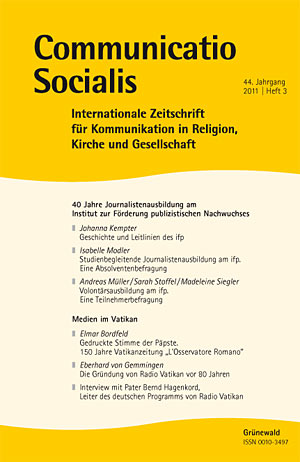Gedruckte Stimme der Päpste. 150 Jahre Vatikanzeitung „L‘Osservatore Romano“
Schlagworte:
Medien, Presse, Vatikan, Papst, L'Osservatore Romano, Politik, Information, Kampfblatt, GeschichteAbstract
In einem Rückblick anlässlich des 150-jährigen Bestehens der Vatikanzeitung „L’Osservatore Romano“ weist der Autor auf die Völkerrechtsverletzung gegenüber dem Vatikanstaat bei der Gründung des italienischen Nationalstaates 1861 hin, durch die Papst Pius IX. den eingeschlossenen Vatikan bedroht sah. Deshalb wurde in diesem Jahr der „Römische Beobachter“ als politisches Kampfblatt des Papstes zur Verteidgung der Rechte des Heiligen Stuhls gegründet. Unter Leo XIII. entwickelte sich das Blatt um die Jahrhundertwende zu einem Informationsorgan des Papstes, und in den 1930er Jahren erlebte es seine Glanzzeit in den Auseinandersetzungen mit dem Faschismus, Kommunismus und Nationalsozialismus, was der Autor mit weithin unbekannten Dokumentationen stützt. Nach dem Zweiten Vatikanischen Konzil folgte eine Neuorientierung zur Weltkirche hin, u.a. mit der Gründung fremdsprachlicher Ausgaben, einem redaktionellen und technischen Ausbau bis hin zum publizistischen Vordringen in die digitale Zukunft: Seit 2011 erscheint die Zeitung auch online.
English
Elmar Bordfeld: The Printed Voice of the Popes. 150 years „L'Osservatore Romano“
On the occasion of the 150th anniversary of the daily paper „L'Osservatore Romano“ the author recalls in a historical review the time of 1861 in which the national state of Italy was founded under circumstances which violated international law and led the state of the Vatican into isolation. As Pope Pius IX. felt this situation threateningly, he founded „L'Osservatore Romano“ as a means of defence for the rights of the Church state. Several centuries later, Leo XIII. developed the Vatican daily to a means of Church informations. In the years after 1930, the „Osservatore Romano“ was widely spread because the paper argued openly against faschism, communisms and nationalsocialism which the author proves by widely unknown documents. After Vatican II., the „Osservatore Romano“ was developed into an information organ for the World Church by editing weekly issues in different languages, enlarging the editorial staff and modernizing technical equipment up to digital communications: Since 2011 the „Osservatore Romano“ also goes online.

